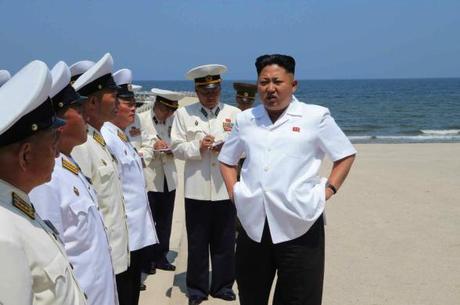
Kim Jong Un talks with KPA Navy commanding officers prior to an assessment of their swimming abilities (Photo: Rodong Sinmun).
DPRK state media reported on 2 July (Wednesday) that Kim Jong Un (Kim Cho’ng-u’n) supervised an assessment of the swimming ability of Korean People’s Army [KPA] Navy commanding officers. Attending this event with him were VMar Hwang Pyong So (Director of the KPA General Political Department), Gen. Pyon In Son (Director of the KPA General Staff Operations Bureau) and Col. Gen. Pak Jong Chon (Vice Chief of the KPA General Staff).
According to KCNA the swimming drill was “organized by the order of the supreme commander was conducted in such a way that the commanding officers of the East Sea Fleet and the West Sea Fleet of the KPA Navy simultaneously started in column formations up to the turn-round point at the distance of 5 km and swam back from it.” Ahead of the drill KJU met the commanding KPAN commanders and “told them that the assessment of their swimming ability was of weighty importance in rounding off the combat readiness of the navy and remarkably bolstering up the combat capabilities by making the training more intense just as the anti-Japanese guerillas did in Mt. Paektu.” He said that “the commanding officers should become good fighters if the army is to fight well. . . modern warfare requires the commanding officers to be prepared not only politically and ideologically and in military technique but physically. The commanding officers are not qualified if they lack physical ability, no matter what good ideological and moral qualities they have and no matter how high military and technological qualifications they are possessed of as they should stand in the van of the combat ranks. When the commanding officers are fully prepared, they can always lead intensive training of service personnel, shouting ‘Forward, following me!’ not ‘Charge ahead!’”
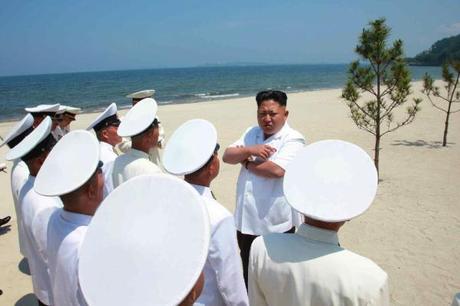
Kim Jong Un speaks to KPA Navy commanding officers at an assessment of their swimming abilities (Photo: Rodong Sinmun).
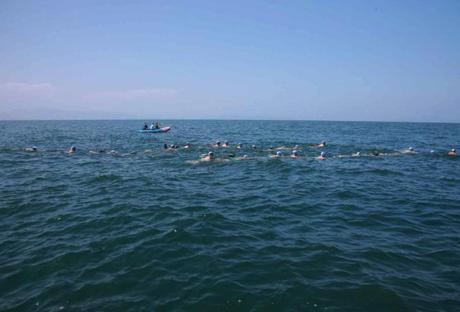
Commanding officers of units subordinate to the KPA Navy’s East Sea and West Sea Fleets participate in an assessment of their swimming abilities (Photo: Rodong Sinmun).
Kim Jong Un also said “seamen should acquire high ability of swimming” and that “only when the commanding officers of the navy are good at swimming, can they lead the seamen and successfully carry out the naval operation for implementing the strategic plan of the supreme command even in vast expanse of sea.” According to KCNA, the KPAN commanding officers “renewed their resolution to fully display the might of Kim Jong Un’s Navy in the assessment event, regarding the drill for assessing the swimming ability to be staged before the supreme commander as a battle field without gunfire.”
The swimming drill began and “participants fully demonstrated the swimming ability they have cultivated in their day-to-day training, displaying great persevering strength, will and team spirit.” Based on KCNA’s report commanding officers of the West Sea Fleet outperformed their counterparts from the East Sea Fleet. Kim Jong Un provided his assessment and review of the drill. According to KCNA he “expressed great satisfaction over the successful drill and set forth tasks to be fulfilled to round off the combat readiness and bolster up the combat capabilities of the naval units including the work for making swimming drill a rule and part of life of the seamen so that they may satisfactorily perform their combat missions under any circumstances.”
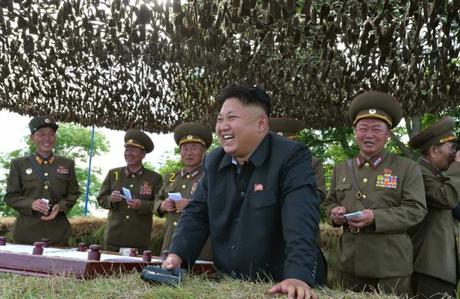
Kim Jong Un at a field inspection of the Hwa Islet Defense Detachment. Also in attendance are KPA General Political Department Director Hwang Pyong So (1) and a Vice Chief of the KPA General Staff Col. Gen. Pak Jong Chon (2) (Photo: Rodong Sinmun).
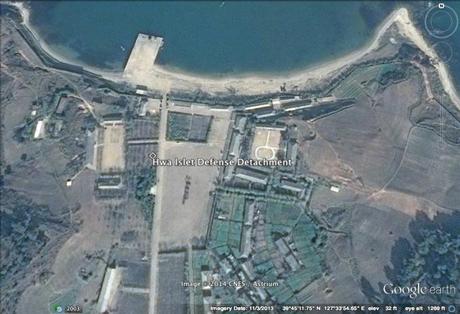
Hwa Islet Defense Detachment (Photo: Google image).
Prior to the swimming drill, KJU’s last observed appearance was his field inspection of the defense detachment on Hwa Islet. Attending the field inspection were VMar Hwang Pyong So and Col. Gen. Pak Jong Chon. His first stop was to a monument commemorating an October 1999 field inspection by his father, late supreme leader Kim Jong Il (Kim Cho’ng-il). According to KCNA, KJU recalled that “President Kim Il Sung (Kim Il-so’ng) gave dozens of precious instructions as regards the islet defense detachment and Kim Jong Il (Kim Cho’ng-il) always paid deep attention to it” and he “underscored the need to glorify their exploits performed in commanding the army with the shining achievements in rounding off the combat preparations and bolstering up combat capabilities.”
He looked at the trees and forest around the barracks and remarked that the “islet is full of trees. It’s better to call the islet Song Islet instead of Hwa Islet as pine trees have formed thick verdure.” KJU “highly praised the detachment for having turned the islet into a thick woodland and greenery and orchard as intended by the party.” Kim Jong Un then received a briefing on the defense detachment’s mission and operations planning.” According to KCNA he underscored the “need to wipe out the enemies coming in attack from the sea to the last man” and “indicated new and unique war methods to be applied by the Hwa Islet Defence Detachment for rounding off its combat readiness such as the deployment of strike means and the effective use of the firing positions as required by the modern warfare.” He also said that the Hwa Islet Defense Detachment “is an advance base in the defense theater” of KPA Large Combined Unit (taeyonhap pudae) #324 “and outpost in the East Sea guarding the gateway to the Party Central Committee.” He noted that it was “an important task of the defense detachment to turn the islet into an impregnable fortress, unsinkable warship and the present-day Wolmi island.”
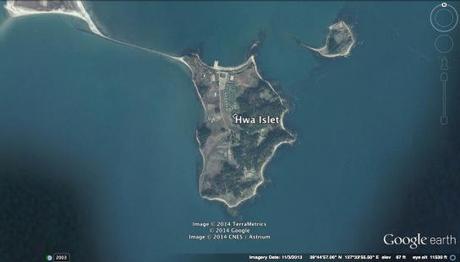
Hwa Islet (Photo: Google image).
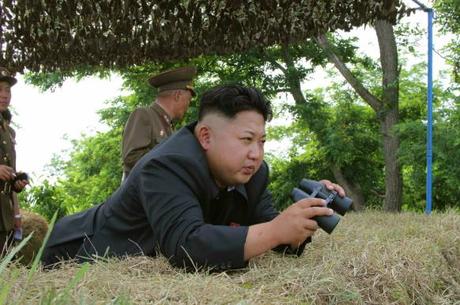
Kim Jong Un observes an artillery exercise of the Hwa Islet Defense Detachment (Photo: Rodong Sinmun).
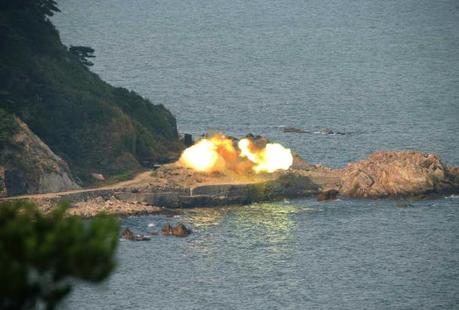
Artillery exercises conducted by the 5th company of the Hwa Islet Defense Detachment (Photo: Rodong Sinmun).
Kim Jong Un issued instructions that the defense detachment’s command staff “intensify the politico-ideological education among the service personnel to train them as phoenixes, underlining the need to make military training, in particular, part of their life and habit and thus build a-match-for-a hundred combat capabilities so that they may send all the enemies intruding into the territorial waters of the DPRK to the bottom of the sea once a battle starts.” KJU ordered and supervised an artillery drill and watched the drill “with deep attention the artillery men in firepower service through a pair of binoculars.” After the artillery drill he remarked that service members “are very good at firing. All of them are crack shots and the commander of the defense detachment has successfully commanded the firing. The artillery men could hit all targets as they have undergone intensive training, bearing deep in mind the call of the party for waging a dynamic movement for becoming crack shots.” KJU called the detachment’s 5th company who conducted the drill “Crack Shots Company” and he “extended the thanks of the KPA supreme commander to it.”
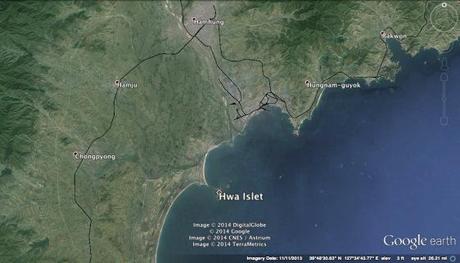
Hwa Islet in relation to South Hamgyo’ng Province (Photo: Google image).
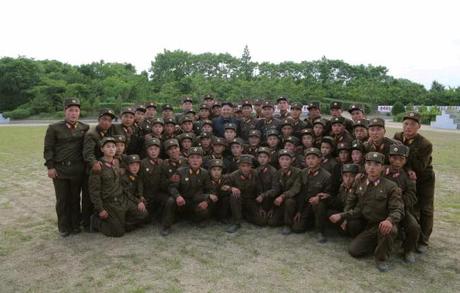
Kim Jong Un poses for a commemorative photo with service members and officers of the Hwa Islet Defense Detachment (Photo: Rodong Sinmun).
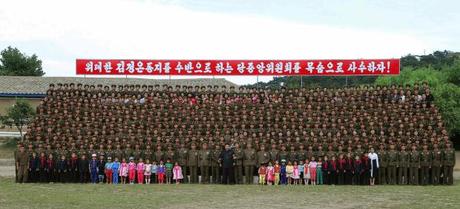
Kim Jong Un attends a commemorative photo-op with Hwa Islet Defense Detachment’s service members, officers and their families (Photo: Rodong Sinmun).
After the artillery drill, KJU toured the the 3rd company’s quarters, bathing facilities, mess and supply. According to KCNA he said that “it is very gratifying to hear that the defense detachment serves every service person with more than 360g of soy-based food every day and each mess hall of the companies is providing the service personnel with fish and with sumptuous meals by raising lots of domestic animals such as pigs, ducks and geese.” He also noted the “companies of the defense detachment are like homes dear to the soldiers and the detachment is like their native village as it provides them with sumptuous meals and warm beds.” Kim Jong Un praised the Hwa Islet Defense Detachment “for most thoroughly carrying out the party’s military policy like the Ryo Islet Defense Detachment” and “called on it to make a high-pitched drive for developing stockbreeding, fishery and soybean farming to turn itself into a more proud and richer detachment in the future.”
Kim Jong Un concluded his field inspection by presenting binoculars and an automatic rifle to the 3rd Company and attended a commemorative photo-op with officers, service members and their families. He expressed “expectation and belief that the service personnel would remain true to the party’s Military-First (So’ngun) revolutionary leadership.
Filed under: 2007-2010 kpa management, Artillery Corps, Central Committee, Central Military Committee, coastal defense units, Col. Gen. Pyon In Son, colonel general, corps command, corps commanders, east sea command, east sea KPN command, East Sea KPN District, gsd, gsob, Guard Command, Hwang Pyong So, Kim Chong-un inspections, Kim Family, Kim Jong Un Visits, Kim Jong-un, KJI Personal Secretariat, Korean People's Army (KPA), Korean Workers' Party (KWP), KPA East Command Zone, KPA General Political Bureau, KPA General Political Department, KPA General Staff, KPA Large Combined Unit #324, KPA Supreme Command, Lt. Gen. Pak Jong Chon, military security command [msc], Ministry of State Security, MPAF GPB, National Defense Commission (NDC), Navy Command, North Korean press, party life, Political Bureau, RGB Maritime Department, Secretariat, State Security Department, VADM Kim Myong Sik (KPAN), West Sea KPN District, wo'nsan corps
